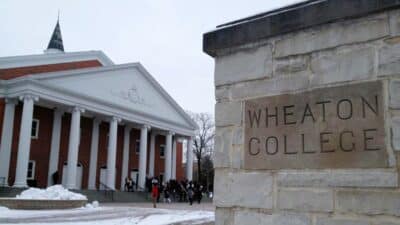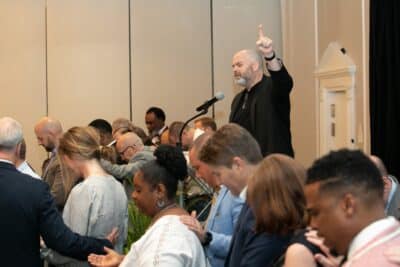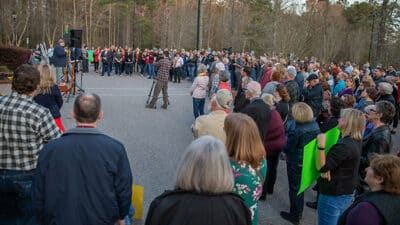The evangelical flagship school, Wheaton College, is removing a plaque commemorating the death of five martyrs killed by indigenous people in Ecuador in 1956 because the plaque refers to the people as “savage.”
For 64 years, the plaque hung in the foyer of Wheaton College’s main chapel, honoring Wheaton alumni Jim Elliot and Ed McCully, along with Nate Saint, Roger Youderian, and Pete Fleming. The plaque was a gift from the classmates of Elliot and McCully to the school.
Wheaton College spokesman Joseph Moore said that about a dozen students and staff told the college they were concerned by the language in the plaque.
In explaining the college’s decision, Wheaton President Philip Ryken said the word “savage” demeaned the Ecuadorian Indians.
“In the 64 years since the College received this gift, we have continued to grow in our understanding of how to show God’s love and respect to others,” said Ryken in an email to students obtained by The Roys Report.
Your tax-deductible gift helps our journalists report the truth and hold Christian leaders and organizations accountable. Give a gift of $30 or more to The Roys Report this month, and you will receive a copy of “Hurt and Healed by the Church” by Ryan George. To donate, click here.
“The word ‘savage’ is regarded as pejorative and has been used historically to dehumanize and mistreat Indigenous peoples around the world,” Ryken said. “Any descriptions on our campus of people or people groups should reflect the full dignity of human beings made in the image of God.”
Ryken added that the college will replace the plaque with one that does not contain the offensive language.
The men who killed the missionaries were from the Waodani tribe, previously known as “Auca.”
Elisabeth Elliot, Jim Elliot’s widow, wrote in her best-selling book, Through Gates of Splendor, that Auca is the Quichua term for “savage.” Elisabeth Elliot also wrote a book about her experience living among the Aucas titled The Savage, My Kinsman.
Moore, however, noted that the word “savage” means something different now than it did in the past.
“The meaning of language and descriptors can change over the decades, and it’s understandable that eventually we would have to examine whether something still honors people appropriately,” he said.
At the time of the murders, the Auca had a reputation as the world’s most violent people. Anthropologists said they were in danger of wiping themselves out by murder.
Steve Saint, the son of one of the missionaries, said about 60% of tribe members were murdered by their own tribe. Almost no one died of natural causes.
Missionaries Elliot, McCully, Saint, Youderian, and Fleming traveled to Ecuador and carefully worked to build trust with the Waodani by giving them gifts. After a few friendly meetings with the tribe, a group of tribe members suddenly speared the missionaries.
After the missionaries’ death, Elisabeth Elliot and Nate Saint’s sister, Rachel Saint, returned to the tribe and eventually led many Auca to faith in Christ, including some of their husbands’ killers.
“We lived angry, hating, and killing for no reason until they brought us God’s markings,” said Mincaye, one of the tribesmen who killed the missionaries.
When Auca became Christians, their violence ended, Micaye said.
“Now, those of us who walk God’s trail live happily and in peace,” Mincaye added. “Maybe if we had known sooner that ‘Waengongi’ (the Creator) did not see it well that people should live angry, hating, and killing for no reason, we could have walked God’s trail sooner.”
Some anthropologists, however, have condemned the missionaries for erasing the Waodani culture of violence and polygamy.
The plaque at Wheaton read: “For generations all strangers were killed by these savage Indians. After many days of patient preparation and devout prayer, the missionaries made the first friendly contact known to history with the Aucas.”

The Roys Report interviewed 14 students on campus at Wheaton. All said they agreed with Wheaton’s decision to change the plaque because of the word “savage.”
Sophomore and history major Bella Hicklin suggested that if an adjective had to be used, the plaque should say “aggressive,” rather than “savage.”
Secondary education major and freshman Aslin Tanco said the removal of the plaque was the right call.
“Wheaton’s doing a better job of trying to be mindful of the language that they’re using and how it harms people, especially indigenous people,” she said. “I don’t think reducing them to their violent tendencies is humanizing because they’re still created in God’s image. It’s also holding them to a Christian standard when they’re not Christians. They’re still people and they’re living life that is not the same as ours. Holding them to our standards wouldn’t necessarily be fair.”
Other students also agreed that Christians shouldn’t describe someone created in God’s image by their violent tendencies.
“The word ‘savage’ that they used should not represent humans,” said sophomore Christian formation major Colleen Davis. “The reason that Wheaton wants to change it is because that is not honoring them in the sense that we are all creations of God. Calling something that God has created a ‘savage’ is not giving it the honor that it’s due. We shouldn’t speak that identity over them.”
The school’s senior administrative cabinet will appoint a task force to recommend rewording, but college leaders and the board of trustees will make the ultimate decision.
 Jackson Elliott is a Christian journalist trained at Northwestern University. He has worked at The Daily Signal, The Inlander, and The Christian Post, covering topics ranging from D.C. politics to prison ministry. His interests include the Bible, philosophy, theology, Russian literature, and Irish music.
Jackson Elliott is a Christian journalist trained at Northwestern University. He has worked at The Daily Signal, The Inlander, and The Christian Post, covering topics ranging from D.C. politics to prison ministry. His interests include the Bible, philosophy, theology, Russian literature, and Irish music.




















80 Responses
Within six months Wheaton will be erecting LGBT plaques and statues on campus etc. Wheaton has been spiraling the sewer for a long time (remember jihad apologist Gary Burge?)–now the transformation is simply complete.
Brian, “jihad apologist “? Talk about hate speech? That is just a shameful way to describe our favorite Bible teacher and seminary dean. It’s just uncalled for and defamatory!
You liberal Evangelicals are on your way out of the faith, just like the Protestant liberals of the early 20th century.
Text of Wheaton President Phil Ryken’s email announcement a few days ago about this:
Dear [name],
I write regarding the plaque hanging in the lobby of Edman Chapel that honors Jim Elliot ’49, and Ed McCully ’49, who—along with Nate Saint Ex ’50, Roger Youderian, and Pete Fleming—were slain in 1956 while endeavoring to carry out the Great Commission with indigenous peoples of Ecuador. In a heartfelt act of remembrance, the Wheaton College Class of 1949 gave this plaque to the College in 1957 to honor their fallen classmates and their colleagues.
In the 64 years since the College received this gift, we have continued to grow in our understanding of how to show God’s love and respect to others. Recently, students, faculty, and staff have expressed concern about language on the plaque that is now recognized as offensive. Specifically, the word “savage” is regarded as pejorative and has been used historically to dehumanize and mistreat indigenous peoples around the world.
Any descriptions on our campus of people or people groups should reflect the full dignity of human beings made in the image of God. With this in mind, the Senior Administrative Cabinet will appoint a task force to review the wording of the plaque and to make a specific recommendation by May 1 for its careful rewording and replacement, subject to a final decision by the Senior Administrative Cabinet, in consultation with the Board of Trustees. Members of the task force will include a faculty historian, a faculty missiologist, a representative from the Wheaton College Alumni Association Board of Directors, a graduate student, and an undergraduate student.
The reworded plaque will carry forward the memory at Wheaton College of brave missionaries and their sacrificial witness, while at the same time respecting the Waodani people with whom they shared the gospel of the love of Christ. It will resume its place in the lobby of Edman Chapel sometime this summer.
In Christ’s service,
Philip Ryken
President
Pretty sad. For 64 years it was never a problem. Yes, all people are created in the image of God, but because of sin, iniquity, and wickedness, that image is broken and mankind needs to be redeemed. The Bible itself uses much worse terms to describe sinful man than the word “savage.” Jesus came to save “savages”, wicked, sinful man from sin, death, and hell. I think it is ok to truly describe mankind like they really are, apart from Christ. To do otherwise is disingenuous. Every person who has not been born again, is an ENEMY of God! Jesus told religious leaders they were of their father the devil! Was he being racist or insensitive? Com’on people. Because of God’s grace and the death of Jesus for sin and His resurrection, any savage sinner can become reconciled to God through faith.
Because a few students complain??!! Seriously? So, Jim Elliot and his wife Elizabeth were wrong, and the friends who donated that plaque? I think many students today need to grow up, as do a lot of adults who don’t know the scriptures.
I have lived my entire adult life overseas as a minority in another culture and experience racist language and attitudes frequently. If you’ve never lived as a minority in your home culture, or never been on the receiving end of racist language/behavior it may be hard to imagine how discouraging it is to be viewed as less than human by another person.
Read the entire plaque in the picture above. It’s quite paternalistic. I have worked with tribal people in Asia. Their “jungles” are no more exotic than our “forests”. Their bamboo thatch houses are no more odd than concrete and dry wall. They’re just different.
Some have pointed out that savage means violent in a general way and can be ascribed to an individual person’s actions, or to a group of people. True. However there is also an undeniable historical connection of applying the word “savage” to various native peoples around the world. That practice was paternalistic and derogatory. it is always the right time to acknowledge such things that and make a change.
While some in our society take being “woke” way too far, their excesses should never keep followers of Jesus from casting off derogatory attitudes and language. Indeed my friends, we should lead the way in gracious healing speech because, “The words of the reckless pierce like swords, but the tongue of the wise brings healing.” (Proverbs 12:18)
On Friday night, down the street from where I live…a gunman emptied a clip on a vehicle. A man, woman, and 2 children were inside.
The man is dead. The woman and the older child are critical. The younger child was not hit.
I personally know the Father of the son who was killed.
QUESTION: How should I refer to the unknown shooter?
What name should I assign the one who committed this act?
This is not a trap. I am asking a legitimate question .
savage
Of course the adjective “savage” is pejorative, President Ryken! Throughout the Bible, a large variety of harsh adjectives and nouns are used to describe people living apart from God. Will you edit these words out of the Bible also?
The Waodani themselves, along with other indigenous South American peoples, acknowledge this is what they were, past tense.
“And such were some of you. But you were washed, you were sanctified, you were justified in the name of the Lord Jesus Christ and by the Spirit of our God.” (1 Cor. 6:11)
Many Waodani people have received this great news and truth, bringing a much better life for them on this earth and for the one to come!
How many of the sensitive, woke people complaining about the wording of the plaque would risk their lives, or sacrifice much of anything at all, to dramatically improve the lives of an unreached people group both now and eternally?
Savage definition: a brutal or vicious person.
“For from within, out of the heart of man, come evil thoughts, sexual immorality, theft, murder, adultery, coveting, wickedness, deceit, sensuality, envy, slander, pride, foolishness. All these evil things come from within, and they defile a person.” Mark 7:21-23 ESV
Sounds like a savage to me. What are they missing here?
I would like to point out an article written by Judith Kimerling entitled “Habitat as Human Rights: Ingigenous Huaorani in the Amazon Rainforest, Oil and Ome Yasuni” presented in 2015 at the Vermont Law Review. See pages 450-469
This is an in-depth historical account of the Huaorani (known also as Auca Indians). Based on everything I have read there and Elisabeth Elliot’s book and Steve Saint’s accounts I do support President Ryken of Wheaton College decision to remove the plaque. Years ago when I first read the story in the newspapers and Elisabeth Elliot’s account of the five missionaries trying to reach the Auca tribe, I wondered what the larger picture of this included since all the missionaries were killed. It was reported that the Auca Indians then were savages, and these devout Christian missionaries went to Ecuador to give them the news of Christ. The Wycliffe Bible translator organization and the Summer Institute of Linguistics supported them in their decision to go to Ecuador. What we failed to hear much about is how the oil companies had met with some missionaries and Wycliffe to discuss their interest in moving the Aucas off the land of their ancestors so they could explore for oil. It is unclear if Jim Elliot knew of this collaboration. The search for oil was all going on from 1936-1950 by the Shell Oil Company. When the Auca’s were not willing to leave their land oil companies realized it would be to their benefit to collaborate with missionaries to reach their goal. Auca’s were familiar with the past when rubber tappers tried to move in on them.They also experienced the Spanish Conquest where villages were over run and their men were either killed or made slaves while their wives were raped. It is actually shocking as a people they were still living by the 1950’s, but they survived becoming a treacherous warring people who tried to fight off all the invaders from their land. Steve Saint a grandchild of the missionaries writes about some of this early violence quoting Captain John a pilot for Shell Oil. He related that Auca’s fought back and killed numerous oil company workers and the oil companies dropped lighted dynamite from their planes on the homes of Auca’s to scare them to leave. This continued on through the 70’s. So with all this historical knowledge it is time we consider our words carefully to describe a people. God made all people in His image. He loves and cares about all from the beginning of time. God never forces human beings to live Godly lives. When we see the dynamics of these events we must try fix those things we can. I do not judge the missionaries for making their choices in the 50’s, but “we can see discrimination and denying the cultural, political,and property rights because we think we are a cultural superior people” is wrong. So continuing to ascribe the word savage to the Auca’s on a prestigious Christian College wall, it is important to rectify this, or add the oil companies executives and pilots who dropped lit dynamite onto the Auca’s homes with men, women,and children be included in this horrific description. It is sobering to think the Auca’s were being killed for their oil by Shell, Texaco, and Chevron.
All information here is documented by Judith Kimberly
Hmm… Hadn’t Shell left by the time the Elliots and others arrived? I thought the Shell base had been purchased by missionaries.
Additionally Ellen Vaughn in her book, Becoming Elizabeth Elliot, describes in detail the motivation behind the killing of the missionaries. It was the result of a conflict that broke out between two of the men. The small group’s leader, who didn’t want these two men to kill each other, redirected their anger toward the missionaries.
Regarding the 5 martyrs as well as the continuing efforts to reach the Waodoni with the Gospel for many years long after this incident, I can HIGHLY recommend the book, “God in the Rainforest: A Tale of Martyrdom and Redemption in Amazonian Ecuador” (2019) by Kathryn T. Long. Dr. Long is a former professor of history at Wheaton College and has really done her homework.
Two adjectives, ‘savage’ and ‘racist.’
If one description is canceled for a specific group of the population, is it morally consistent to continue using the other adjective for another group?ell
I’m sorry, Ed, but your question does not comply with current thought standards and will be forwarded to the thought police. Consider yourself CANCELED!
Sounds a good idea to me to remove the plaque or at least change the wording. Why antagonize those who are sensitive to such statements? I believe sensitivity to other people’s feelings is in order here.
Fact: Indigenous people who lived in a remote area of Ecuador, not a part of civilization as we know it, were contacted by white missionaries for the first time ever. These naked inhabitants of the jungle turned on the 5 men and slaughtered them with spears and other implements. The missionary men left wives and children, who would later reach the same tribesmen with the gospel of Christ. It WAS a “savage” slaughter, the five men armed with a rifle clearly did not fight back, but willingly gave their lives for the “greater good” of someone later reaching out to the tribe with the gospel.
Anyone being offended by the word “savage” should read the late Elizabeth Elliot’s book, “The Savage, My Kinsman,” actually a very good read and with pictures too. But I suppose that the book should be renamed too… Also an incredible read is Elliot’s historical account of the martyrdom of the five men, “Through Gates of Splendor.”
Point is “it was what it was.” Political correctness cannot change history. Thank God that the people who slaughtered the missionary men were/are no longer violent. Christ changed their lives! The story has a good ending!
But if the College is going to throw that old plaque out, I would love to have it! It is a beautiful memorial to the fact that “If any man be in Christ, He is a new creation” -2 Corinthians 5:17.
And to Jim Elliot’s prophetic words: “He is no fool who gives up what he cannot keep to gain that which he cannot lose.”
“He is no fool who gives up what he cannot keep to gain that which he cannot lose.”
Perfect quote for the plaque, and a more fitting memorial. Perhaps the new inscription could be placed in large letters with a 2021 date, while the older plaque inscription could be preserved in much smaller print or older plaque could be saved at another location, e.g. library?
As a general rule, I object to changing monuments and inscriptions. They preserve the thinking of the time. Hence, they are valuable historical documents. I was walking through an old cemetery one day and saw a monument to a dead cavalry solider. It read, “He saved us from the terror of the savages.” I don’t think it should be fixed now. If you lived in the 1800’s and had all of your family members slaughtered and scalped, your babies impaled on spears, you’d identify with that. It’s part of the story of the time, a slice of time. That’s how those who buried him and commemorated him thought about the soldier. A memorial to native warriors of the time on a reservation would read differently. That’s how history works. Lots of voices, lots of different experiences, lots of different points of view. To go back and change the sentiments of the original writers and inscribers is dishonest, especially for private memorials.
Moreover, I’m sure the Waodoni people would agree that they were savage. “I was a brute beast before you…” Psalm 73. My pagan European ancestors WERE savage while they were painting themselves blue and offering sacrifices (including human sacrifices) to bloodthirsty indigenous gods. I thank God every day that Jesus bound Satan so that he could no longer deceive the nations, including my ancestors.
How about the word “Sinner?”
People need to understand that this won’t be an isolated occurrence of being “offended”. Let those who are offended transfer to another school if they are so offended.
This is getting ridiculous. If this doesn’t stop, we will see people offended by the words in the Bible.
They already are!
“Anthropologists said they were on the verge of wiping themselves out due to their violence” Sure sounds savage to me!
As the mother of a current Wheaton student and another daughter who has been accepted to the college, I am experiencing some buyer’s remorse. Or better put, I am grieving over what Wheaton has been in the past and is clearly no longer. It seems like every semester my now Junior shares with us how Wheaton self inflicts another crisis on itself. Frankly, it’s disheartening.
The college is jumping on the Woke bandwagon by changing the plaque. This is wrong. The word savage clearly describes an extremely violent people who needed Jesus, and the missionaries were that much braver for willingly going to evangelize them.
There is a rewriting of history going on, and it looks like Western Civilization and white men are not the good guys. The Spanish Inquisition, Naziism, and the French Revolution all had their woke beginnings…Hopefully, we can get off this slippery slope America is on.
By removing statues, plaques, and books that offend, we are giving in to the Woke Left, who want to fundamentally transform America as we know it. Conservative Christians should stop caving and start resisting this rewriting of our history.
So what happens when students find the blood of Christ offensive? the correct response to these students should have been, ……Maybe you would be more comfortable at a different school.
This is a poorly organized report that led people to believe the wrong thing.
The opening of this article states that Wheaton was removing the plaque. But the reality is that they were merely temporarily taking it down.
Check out the opening of the article:
“The evangelical flagship school, Wheaton College, is removing a plaque commemorating the death of five martyrs”
What a misleading opening!
Very strangely, down at the bottom of the article it mentions that a new plaque will eventually go up. So the writer knew this was happening but neglected to make that clear in the title or the first paragraph. Was this to merely get more clicks?
To lead with a sentence like that is to mislead the readers and irked many angry responses because they thought it meant Wheaton was simply taking it down permanently.
Generally speaking, the Roy’s Report does a good job. But this article did communicate effectively the real intent.
Are you saying Jackson’s “real intent” was to “get clicks” and “mislead”? That’s really unfair. I apologize that the lead didn’t communicate more clearly. As editor, I should have caught that. But I can assure you that Jackson is one of the most sincere and earnest people I know. Plus, as a freelance writer, he would have no incentive to get more clicks for The Roys Report.
I hope you read the follow-up to this piece about the new plaque Wheaton commissioned to replace this one. https://julieroys.com/reworded-wheaton-college-plaque-omit-savage-indians/
Of course there was also a good discussion of the changing of the words. So apparently some indeed read the entire article. ????